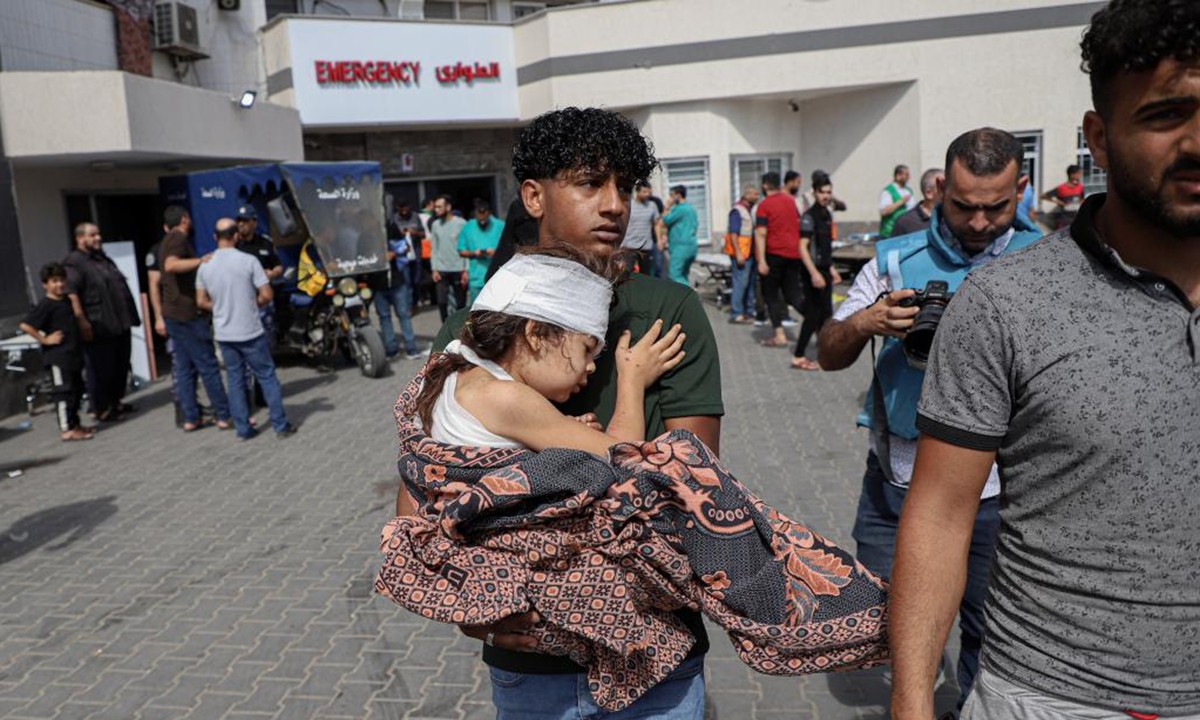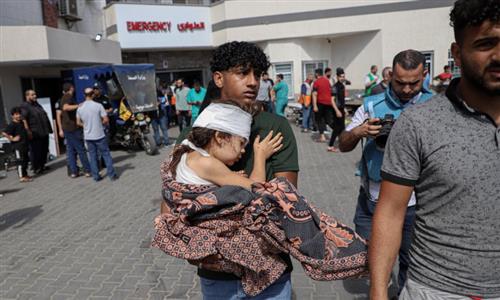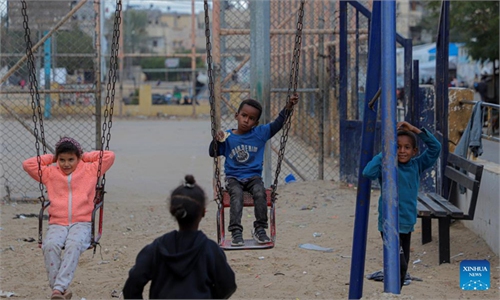
A man carries an injured child at a hospital after Israeli airstrikes in Gaza City, Oct. 17, 2023. Since the bloody conflict between Hamas and Israel began on Oct. 7, a total of 2,808 Palestinians have been killed and 10,850 others wounded, according to figures released by the Hamas-run health ministry. (Photo: Xinhua)
The world must speak out together in the face of the disheartening situation in Gaza, appealed Chinese Ambassador Zhang Jun. As this month's president of the Security Council, China has been galvanizing meaningful and responsible action in the Council. Following an initial step - the adoption of Resolution 2712 - in ceasing the hostilities, Foreign Minister Wang Yi will preside over a high-level meeting on the Israeli-Palestinian issue on Wednesday to step up coordination and build up consensus.
There is no time to lose in Gaza: buildings crumpled and canted, a pile of dead bodies pulled from the rubble, the entire Gaza city being awash in scenes of death, destruction and despair. After more than a month of war and a near-total siege, frantic people are asking when this will end. Yet the sun rises as usual, ushering in only a worse day. In such horrific scenes, over ten thousand Palestinians have been killed, overwhelmingly women and children. Shortages of fuel, clean water and food - imposed by an Israeli blockade - pose a growing threat to the lives of many thousands more. Gaza is no longer on the brink of hell, but a graveyard.
All the forces are trying hard to hold things together. The UN agencies have been sheltering the displaced as well as delivering supplies to the besieged. Although the Security Council failed to adopt four draft resolutions in October, it has been endeavoring for relevance and concerted action. Faced with increasingly perilous conditions, it sent a clear signal on November 15 by adopting Resolution 2712. The resolution calls for "urgent and extended humanitarian pauses and corridors" in Gaza, with an overarching emphasis on child protection. While incomplete and belated, it is of positive significance as an important first step in the right direction. The Council is still grappling with the difficulty of remaining united in formulating follow-up actions even if its members share the goal of avoiding bloodshed.
Despite continuous appeals by Palestine for a cease-fire, Israel vows to fight until the battle is won. Israel claimed that the only way out of the cycle of violence is to destroy Hamas' rule and a cease-fire or humanitarian pause increases the likelihood of its survival. Israeli Prime Minister Benjamin Netanyahu said in a televised address that Israel's battle to crush Gaza's ruling Hamas militants will continue with "full force."
The discourse in the Middle East has become more critical of Israeli aggression as the intensifying violence has deepened anger, hatred and grievousness. Most Arab states, including those that have improved relations with Israel, such as the United Arab Emirates and Bahrain, blamed the Israel Defense Forces for the disaster. Egypt and other states called for an immediate ceasefire. The dire situation may trigger a spill-over effect, posing great danger to these countries surviving their tough times.
The world has been watching to see if the US, a country that once held sway in the Middle East, can stop this from exploding further. Regrettably, US' one-sided position has impeded it from mediating between regional leaders and shaping events. It offered Israel unwavering support by supplying it with munitions, diplomatic support and an aid package worth $14.5 billion. As a result, Gaza's plight is now inspiring unprecedented protests and disputes as the conflict is raging on streets and screens. To think a war risks becoming a devastating quagmire but to support it nonetheless is an untenable position. Although the US administration has begun to show a bit more concern for civilians and support "humanitarian pauses," it has rejected calls for an outright ceasefire. Chess players are contemplating the next move, Palestine and Israel are the pawns in their hands. However, each move comes at the cost of thousands of innocent lives.
Despite some agreements, European countries share no common vision. While London and Berlin are more inclined to align with Israel's positions, Paris and Madrid are more careful about the Arab world and Palestinian rights. Within each country, people are polarized. Despite the unparalleled rise in pro-Palestinian demonstrations across Europe, BBC faced an outcry due to its reluctance to refer to Hamas as "terrorists." Even within the European Union, unity is difficult to achieve. After Germany and Austria suspended their bilateral aid payments, Brussels announced a review of its development aid to Palestine amid claims that it may be funding extremism. Although the EU is now poised to approve continued Palestinian development aid since it found no trace of links between its financial support and terrorist groups, some EU officials emphasized the necessity to further strengthen the controls over the aid. No European country is powerful enough to stand alone as a major player, but together their voices verge on inaudible.
Russia has responded to the crisis in a relatively guarded manner as it has stayed on good terms with both Palestine and Israel over the years. It called on both sides to immediately ceasefire and blasted US policies in the Middle East. While Russia strives for its own contribution to the settlement process, often these are hushed up and hollowed out by the Western bloc. Two resolutions proposed by Russia in the Security Council failed to secure sufficient votes in favor.
China's independent and impartial position makes it an ideal mediator. China has not only become the largest trade partner of many Middle Eastern countries, but also has taken the plaudits for the restoration of diplomatic relations between Saudi Arabia and Iran. Its closer ties to the Middle East are not the only reason, its diplomatic philosophy became more attractive. Instead of trying to be a savior, China encourages Middle Eastern countries to find a development path that suits their own national conditions. Concerning the current crisis, China advocates an immediate cease-fire to guarantee the security concerns and legitimate rights of both Israel and Palestine. It has also remained in close contact with all parties over the flare-up. Zhai Jun, the Chinese government's special envoy on Middle East issues, used his good offices to promote peace talks and encourage countries to support UN's role. Multilateral events such as the Belt and Road Initiative Forum and BRICS virtual summit have also served as platforms to enhance collaboration among countries in halting the situation. In assuming the presidency of the Security Council this month, China has been forging consensus to restore peace. The adoption of Resolution 2712 brought hope of a respite from the current nightmare in Gaza. The delegation of Arab-Islamic foreign ministers showed their deep trust in China by making Beijing the first leg of their visit. The high-level meeting of the Council on the Israeli-Palestinian issues has drawn great attention, as it may facilitate further steps within multilateral frameworks.
The great powers' tactic of meddling in regional politics no longer works, and a new era of the "two-state" solution has dawned. Because of pogroms, Israel needs to create a land where Jews know they will not be persecuted for being Jews. One should not lose sight of the fact that Palestinians deserve a state, too. Palestinians have survived years of occupation, blockade and wars. They are also waiting for justice and peace. Both countries must therefore start thinking about how to create the conditions for a peaceful coexistence. Though for the time being, the "two-state" solution is a far-off dream, it is necessary to start to make efforts.
People in Gaza are trying to survive and waiting for an end to the conflict that seems a long way away. They have no time for geopolitical games but only beg the international community not to let slender hopes for peace in this age-old conflict be buried under Gaza's rubble.
The author is an observer of international issues. opinion@globaltimes.com.cn


